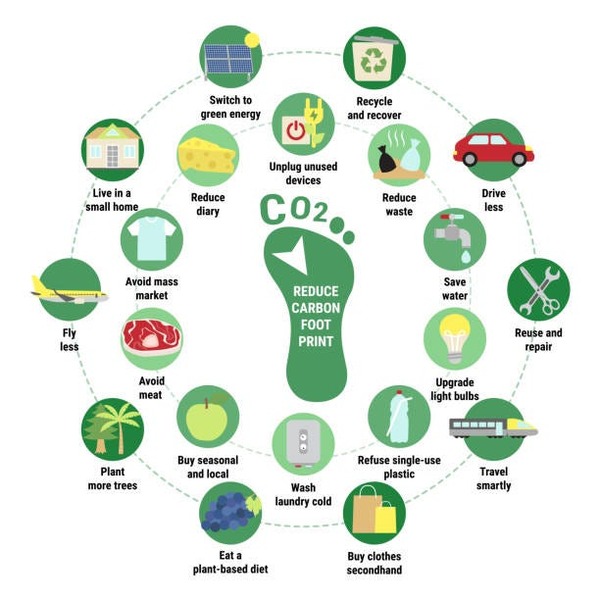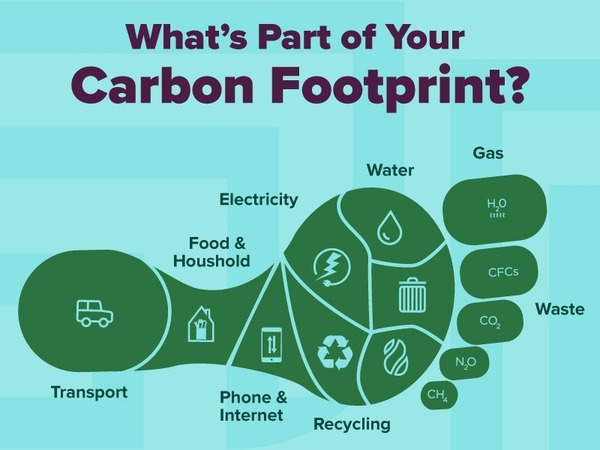How to reduce your carbon footprint is a crucial step in combating climate change, and one effective way to achieve this is through mindful dietary choices. Reducing your carbon footprint heavily depends on the foods we consume, as different products contribute varying levels of greenhouse gas emissions.
The production, transportation, and consumption of animal-based foods generally have a higher carbon footprint comparted to plant-based alternatives. This disparity is particularly evident when contrasting the carbon footprint of beef and chicken production. To illustrate, producing 100 grams of protein from beef generates approximately 50 kilograms of carbon dioxide equivalent emissions, while chicken production results in around 7 kilograms of emissions for the same amount of protein.
The Environmental Impact of Beef Production
Extensive land use, feed cultivation, and methane emissions from cattle largely account fro the staggering carbon footprint of beef production. Livestock production occupies approximately 30% of the world’s surface, with grazing and feed crop cultivation utilizing a significant portion. This extensive land use not only contributes to deforestation but also hampers natural ecosystems’ ability to act as carbon sinks, which would otherwise absorb and store atmospheric carbon dioxide.
Deforestation, driven by the need for agricultural land expansion, exacerbates various environmental issues, including biodiversity loss and climate change. As the world population continues to grow, the demand for food production rises, further straining our planet’s ecosystems. To reduce your carbon footprint, consider substituting other protein sources for beef when possible. It addition to contributing to yoiur personal well-being, it can help mitigate climate change impacts.
Plant-Based Diets: How to Reduce Your Carbon Footprint
In contrast, plant-based diets typically have a much lower carbon footprint. If the land currently used for livestock productiion were to revert to forest, the potential for carbon seqestration and greenhouse gas emission reduction would be substantial. Forests act as natural carbond sinks, playing a crucial role in mitigating change by absorbing and storing atmospherice carbon dioxide. See Osprey Lifestyle gear for hiking, biking and travel.
Studies suggest that a vegan diet can have a carbon footprint up to 73% lower than a diet rich in animal-based productis. Even incorporating more plant-based meals into a varied diet can make a meaningful difference in how to reduce your carbon footprint and individual environmental impact. This is particularly significant considering the substantial contribution of the food system to global greenhouse emissions.

Types of Plant Based Diets
Plant-based diets, defined in terms of low frequency of animal food consumption, have been increasingly recommended for their health benefits. A plant-based diet focuses on limiting or eliminating animal products. There are numerous types of diets within this framework. Some of them are:
- Vegan: This diet excludes all animal products, including meat, fish, dairy, eggs, and honey.
- Vegetarian: Vegetarians avoid meat, fish, but may consume dairy and eggs.
- Pescatarian: Pescatarians eat fish and seafood, but may not eat meats.
- Lacto-vegetarians consume dairy products but no other animal foods.
- Flexitarian: This diet involves mainly plant-base foods, with occasional usage of animal products.
Our food choices create vastly different carbon footprints, with animal-based products like beef generating significantly higher impacts compared to plant-based alternatives. By making informed decisions about our diets and promoting policies that encourage a shift towards more plant-based options, we can collectively contribute to mitigating climate change and reducing our environmental footprint.
All of the above is for information only, and is not to be taken as medical advice. Please consult a healthcare professional for formal dietary recommendations.
Barry Schustermann
Follow me on X @BarrySchust
Follow me on Facebook @Barry Schustermann



